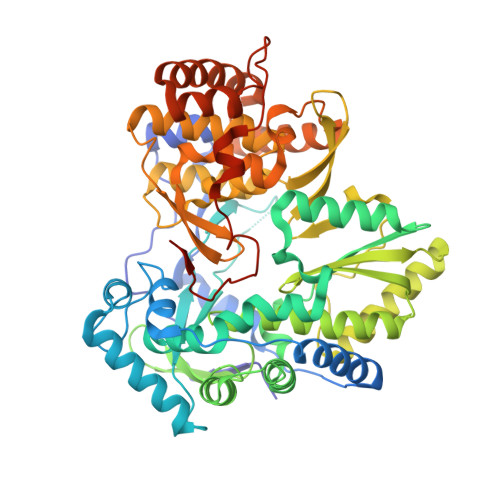1,5-benzodiazepines, a novel class of hepatitis C virus polymerase nonnucleoside inhibitors.
Nyanguile, O., Pauwels, F., Van den Broeck, W., Boutton, C.W., Quirynen, L., Ivens, T., van der Helm, L., Vandercruyssen, G., Mostmans, W., Delouvroy, F., Dehertogh, P., Cummings, M.D., Bonfanti, J.F., Simmen, K.A., Raboisson, P.(2008) Antimicrob Agents Chemother 52: 4420-4431
- PubMed: 18852280
- DOI: https://doi.org/10.1128/AAC.00669-08
- Primary Citation of Related Structures:
3CSO - PubMed Abstract:
The exogenous control of hepatitis C virus (HCV) replication can be mediated through the inhibition of the RNA-dependent RNA polymerase (RdRp) activity of NS5B. Small-molecule inhibitors of NS5B include nucleoside and nonnucleoside analogs. Here, we report the discovery of a novel class of HCV polymerase nonnucleoside inhibitors, 1,5-benzodiazepines (1,5-BZDs), identified by high-throughput screening of a library of small molecules. A fluorescence-quenching assay and X-ray crystallography revealed that 1,5-BZD 4a bound stereospecifically to NS5B next to the catalytic site. When introduced into replicons, mutations known to confer resistance against chemotypes that bind at this site were detrimental to inhibition by 1,5-BZD 7a. Using a panel of enzyme isolates that covered genotypes 1 to 6, we showed that compound 4a inhibited genotype 1 only. In mechanistic studies, 4a was found to inhibit the RdRp activity of NS5B noncompetitively with GTP and to inhibit the formation of the first phosphodiester bond during the polymerization cycle. The specificity for the HCV target was evaluated by profiling the 1,5-BZDs against other viral and human polymerases, as well as BZD receptors.
- Tibotec BVBA, Generaal de Wittelaan L11B 3, 2800 Mechelen, Belgium. onyangui@its.jnj.com
Organizational Affiliation:

















